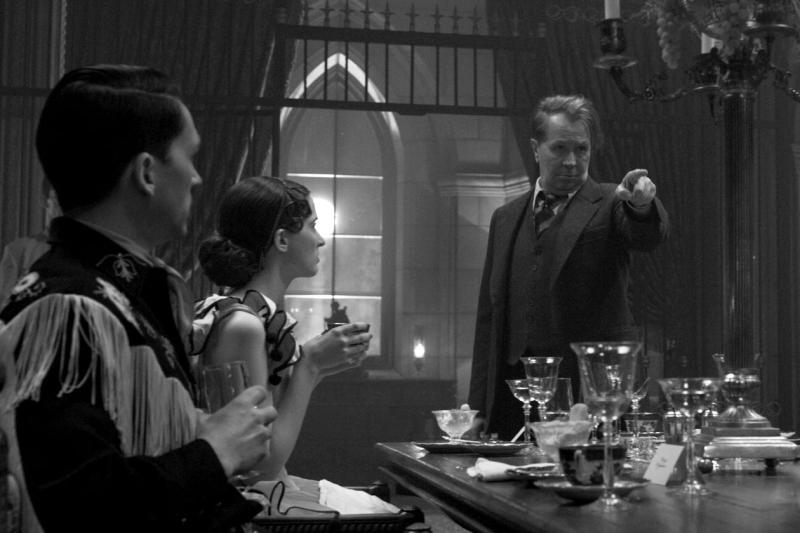'Mank' Review: 'Kane,' and Able
By: Joe Morgenstern (WSJ)



David Fincher’s fascinating, flawed and hugely ambitious “Mank,” opening in select theaters before next month’s streaming debut on Netflix, dramatizes the tumultuous life of Herman J. Mankiewicz (an extraordinary performance by Gary Oldman). He’s the gifted, self-destructive writer who got first billing—over Orson Welles—for the original screenplay of “Citizen Kane,” considered by many to be the greatest of all American films. The first thing to note about Mr. Fincher’s film is what immediately meets the eye. It is gorgeous—not just eye candy but, in its radiant black-and-whiteness, graphic caviar. The lighting and cinematography, by Erik Messerschmidt, emulate the bold, expressionist style of “Kane,” a 1941 feature, directed by and starring Welles, about the flamboyant life and sinister influence of a newspaper tycoon unmistakably modeled on William Randolph Hearst.
“Mank,” which was written by Mr. Fincher’s father, Jack, who died in 2003, is a signal event for film lovers and history buffs, though for reasons I’ll get to later it isn’t particularly entertaining. Some productions use historical settings as picturesque backgrounds and little more. Here the hero is intimately bound up with his time and place—1930s Hollywood, when the movie industry was at the height of its glamour, and men of vast and steely influence ruled the studio system. The film is also catnip for film critics. Its director has acknowledged the film’s genesis to be Pauline Kael’s “Raising Kane,” a 1971 essay in the New Yorker in which the critic argued at great length, powerfully and controversially, that Mankiewicz alone was responsible for conceiving and writing “Citizen Kane,” despite Orson Welles’s subsequent claims to authorship, and notwithstanding original-screenplay Oscars bestowed on both men.
Rather than type or write the script by hand, Mank dictates it—mostly from bed, because of a broken leg from a car accident—to a supportive secretary, Rita Alexander (Lily Collins), over the course of several weeks at an isolated guest ranch in California’s high desert. He does so in desperate fits and starts during the present-tense passages of a time-hopping narrative, and if the drama of a middle-aged alcoholic in the throes of dictation sounds like a less compelling version of drying paint, nothing could be further from the truth.
Broke and almost broken in his early 40s after years of boozing and compulsive gambling, Mank is an arresting spectacle, and a poignant one: “I should have done something by now,” he tells himself. Fueled by his furtive intake of more booze, he labors under relentless pressure from the wunderkind Welles, who is all of 24, to turn a great but dangerous idea—taking on the still powerful Hearst—into a practical shooting script. Mank is at a point in his life’s journey that could be a crossroads, a sinkhole or both, and Mr. Oldman captures the writer’s lightning-in-a-bottle wit, as well as Mank’s loathing for the sad wreckage he’s become, which the actor expresses with airy and exquisitely nuanced self-irony. (Welles, a secondary figure in this scheme of things, is impersonated by Tom Burke, who gets the legendary voice approximately right, if nothing else. Mank’s younger brother, the writer and director Joseph Mankiewicz, is played appealingly by Tom Pelphrey.)
Another fine performance emerges in flashbacks: Amanda Seyfried as Marion Davies, Hearst’s mistress and a movie star whose best days, and a number of charming performances, are behind her. Ms. Seyfried’s work seems shallow at first—maybe that fits with Pauline Kael’s description of “Citizen Kane” as a “shallow masterpiece”—yet it deepens into something quite beautiful, a tender portrait of a sweet soul who befriends Mankiewicz, and, as she tells him later, actually loves the willful, often tyrannical Hearst. Mank, for his part, betrays them both by holding them up to scorn and ridicule, among many more complex qualities, in the screenplay he’s writing for Welles.

Amanda Seyfried as Marion Davies
PHOTO: NETFLIX
Mr. Fincher heaps his own flavor of scorn on Hollywood’s studio chiefs and their lieutenants in flashbacks that evoke Mank’s life as a rumpled virtuoso in the ranks of screenwriters and a fixture—more precisely a drunken court jester—at lavish parties at San Simeon, the baronial California estate that Hearst liked to call “our little hillside home.” The flashbacks are stylishly conceived—the production designer was Donald Graham Burt—and densely populated with simulacra of the rich, famous and notorious: Look, there’s L.B. Mayer (Arliss Howard) feigning human feelings, and Irving Thalberg (Ferdinand Kingsley) not deigning to. But the characterizations are joyless (unlike those in “Citizen Kane”) and the energy is brittle and false. These sequences are unconvincing because they seem to be scoring points in the service of heavy-spirited satire: Look again at how decadent and despicable these people are. (Genuine energy, and lots of it, is conferred by the nervous, often anachronistic music by Trent Reznor and Atticus Ross.)
“Mank” is further weighed down by a long and detailed subplot involving the notorious 1934 gubernatorial contest in which the muckraking author Upton Sinclair, a former Socialist Party member running as a progressive Democrat, failed to unseat the conservative Republican incumbent, Frank Merriam. The drama here turns on shadowy efforts by Hearst and Mayer to manipulate the outcome in Merriam’s favor, including the production and distribution of a scurrilously fake newsreel. It’s all pertinent to the yellow journalism that “Citizen Kane” decried with such delicious verve, and foreshadows the propaganda techniques polluting contemporary politics. In addition, Mr. Fincher enlivens an election-eve party with a couple of dazzling montages—lights flashing, cigarette smoke swirling, champagne flowing—that honor the visual style of “Kane.” The deadening part, though, is Mank’s dinner-table dispute with Mayer and Thalberg about the morality of their manipulations. He’s wise and wryly eloquent, as always, yet the confrontation seems to be part of another movie that’s been shoehorned in for polemical purposes.
What’s strong and true in this movie doesn’t depend on impressive contrivance, or a steady succession of bons mots, some of which aren’t as bon as others. It’s the celebration, with ample irony and paradox, of screenwriters in general and Herman Mankiewicz in particular, and all of the authentic feeling flows, as if unbidden, from the depths of Mank’s anguished soul. “Mank” really is about betrayal—not just what the hero does to others but how, over the years and decades, he has betrayed the precious talent at his core. Yet it’s equally about him saving his soul. The worst fix he’s ever been in yields the best thing he’s ever written.




